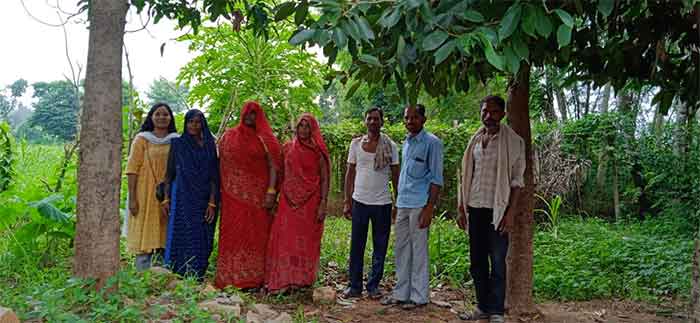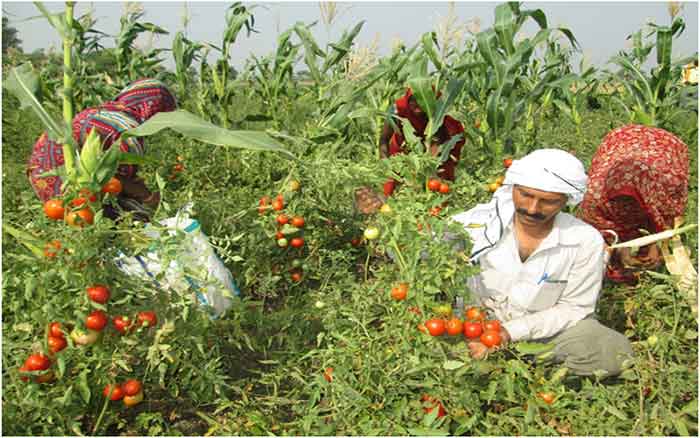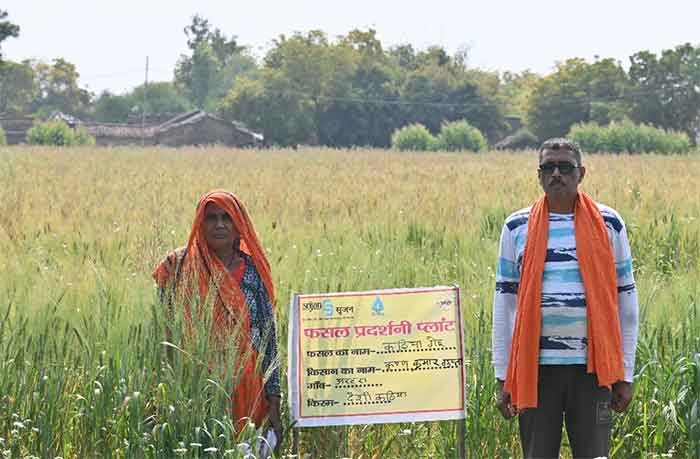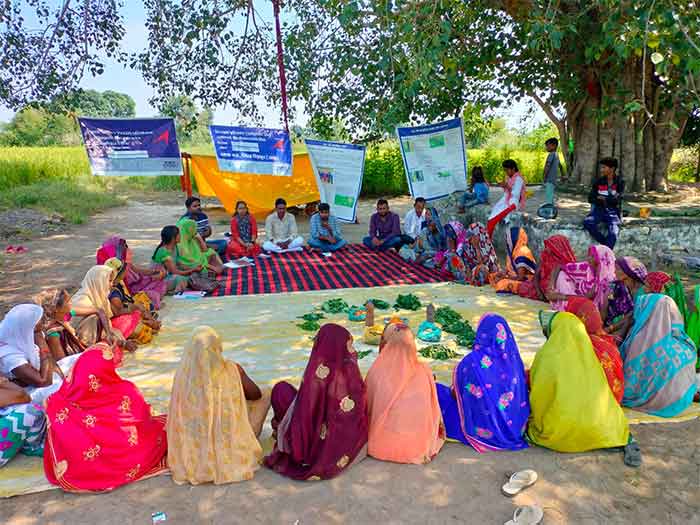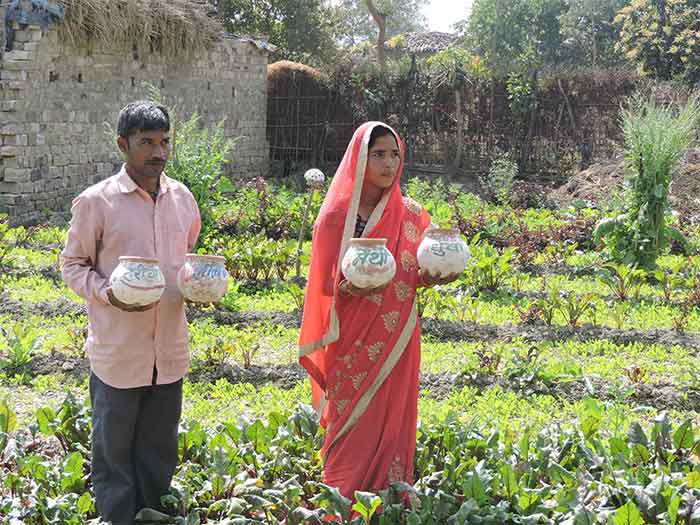
About 30 farmers of Elha village ( in Manikpur block of Chitrakut district, Uttar Pradesh) have gathered for a group discussion in the courtyard of a farmer, along with activists of a voluntary organization ABSSS . One of the main subjects of discussion is—how far can the efforts of natural farming initiated about two years back progress?
Two farmers Ram Bishun Yadav, Shiv Avtar Yadav and an activist farmer Gajendra Singh ( from a nearby village) enter into a discussion on the progress achieved so far. In summary they say that a farmer getting 2 quintals earlier on a bighas has been able to get 4 quintals, in monetary terms increasing income from about INR 2000 to INR 4000. At the same time there has been a saving of INR 2200 per bigha by giving up expenditure on chemical pesticides and chemical fertilizers, as also less intensive use of irrigation. Fodder or bhusa availability has increased by about INR 1000. Thus they calculate an increased net income of about INR 7200 per bigha of land.
However before we rush to too optimistic calculations, we must add that this calculation is based on those who have done very well in recent spread of natural farming, and not all have done equally well. Secondly, this result is not achieved just from natural farming practices alone as the natural farming was preceded by the cleaning of village’s main water tank, deposition of its fertile silt on fields of farmers as well as other water conservation efforts. Thus the farm production increase is the combined result of these three factors—deposition of fertile silt, water conservation efforts (the taking out of silt resulted in increased rainwater collection in the tank and much improved recharge) and natural farming practices based on better use of cow dung and cow urine, as well as various other improved methods based on local village resources.
Those who have taken up multi-layer vegetable production using organic methods are able to increase their production and income even more, and this too from very small plots of land. This can be seen more clearly in Sakrauhan village of this block. Sarita and her husband Rajbohar are known for their very well cultivated multi-layer vegetable farming in which over 15 vegetables are grown in such a way that their various plants are protective and helpful to the growth of each other. Rajbohar who personally goes to sell vegetables says that those grown organically are valued by customers for their better nutrition and taste and fetch a better price too. He had just cycled a long way to sell vegetables when I met him, and what impressed me most was that despite being so tired he was so enthusiastic and happy when speaking about his vegetables. Meanwhile Sarita has already emerged as a leader of this movement of natural farming, having established a natural farming center where she stores surplus improved organic manure and pest repellants prepared in improved, scientific ways from locally collected cow dung and cow urine.
Another farmer Ram Niwas Kushwaha says—I was cultivating vegetables earlier too, but now with multi-layer garden and natural farming there are so many improvements—better productivity and income as well as improvement of soil.
In kitchen gardens such cultivation is done closer to home on an even smaller scale and lower budget. This has been adopted by a higher number of women in improved ways, contributing much to improved nutrition. Some of them stated that the vegetables cultivated by natural farming are cooked more easily and quickly, resulting in fuel saving as well.
However what they highlight most of all is the health benefit they receive from organically grown vegetables and grains. Illness in family has reduced since we adopted natural farming, they say.
In Sakrauhan as well as several other villages of this block, the earlier work of ABSSS with kol tribals and dalits had resulted in the securing of their land titles and distribution of land among several of them. Thus the weakest sections also have some land, and this makes it possible to take the benefits of natural farming and related improvements to them too.
In Sakrauhan as well as in Gidurha village, these efforts had started with the cleaning of village tanks and deposition of fertile silt in fields. In Gidurha village of this block, some Christian farmers like P.M.Charan and Allen have taken a lead role in natural farming and promoting it among others too. Charan says—These activists spreading natural farming have encouraged even an elderly person like me to take up a new challenge. This is very constructive and promising and even in my old age I like to spend a lot of time in my fields now, although earlier I was taking very little interest in farming.
Charan has made a careful evaluation of costs and benefits. He says—Initially there can be some problems in getting the same grain yield as the one obtained using chemical fertilizers, but even providing for this, this year my expenses have come down so much that that even with a somewhat lower production of grain my net income will be higher.
In the case of his vegetable garden, high production achieved by natural farming is clearly visible. Apart from the technology he learnt, he is also contributing with his own experiments to increase productivity further, particularly in the context of onions.
Ram Kushwaha belongs to a family which owns as many as 100 cows. He says—So we have been using cow dung manure for a long time, but now we use this and cow urine in more scientific and productive ways and this is bringing us good benefits.
Within a short time these efforts have launched many farmers on a path full of many creative possibilities. These efforts of ABSSS in Manikpur block are supported by SRIJAN as a part of a wider project called BIWAL for promoting sustainable development in villages of Bundelkhand region.
Bharat Dogra is Honorary Convener, Campaign to Save Earth Now. His recent books include ‘A Day in 2071’, ‘Navjeevan’ and Hindi Cinema and Society.

